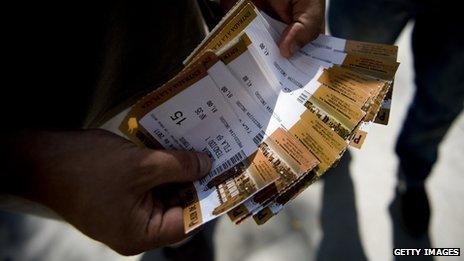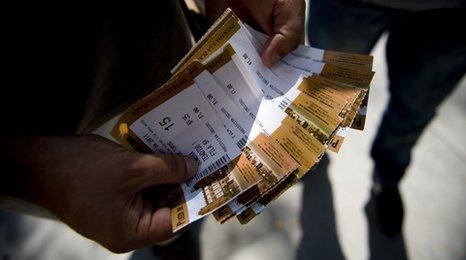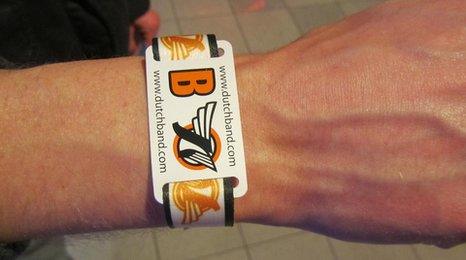Festival boss criticises government over ticket resales
- Published

A top UK festival boss says he's "disappointed" that the government isn't taking action over the resale of tickets for live music events, like it has for the London Olympics.
Reselling tickets for London 2012 outside of authorised resellers is illegal.
Melvin Benn said the decision not to regulate the resale market for music had "left the problem with us".
The government says it has no intention of regulating the websites.
'Touting problem'
Melvin Benn, who organises events such as the Reading and Leeds and Latitude festivals, told Newsbeat: "I do feel it's one rule for one thing and one rule for another.
"The Olympics did it the easy way. The just wrote a law and passed it. They've got that mechanic at hand to them.
"I didn't think it was massively helpful to us. He [Culture Secretary Jeremy Hunt] has left the problem with us really."
Benn, along with some music industry representatives, have campaigned for a 10% profit cap on the resale of tickets to avoid sellers charging fees way beyond the face value of a ticket.
A statement from the government given to Newsbeat said: "High prices charged by touts may irritate some people - but they have the option of walking away.
"We do sympathise with those fans who feel they are being priced out of certain events by secondary sellers and would like to see the introduction of tighter operating practices by primary ticket distributors.
"Unless there is a demonstrable market failure there is not a case for government action."
Benn, along with other music industry representatives, has met the Culture Secretary to discuss the issue.
Hot topic
The subject of reselling tickets and secondary ticketing websites has been a hot topic in the music industry in recent years.
Secondary ticketing website Viagogo recently defended the practice of gig promoters selling tickets on its website saying "we don't discriminate" about who sells tickets on the site.
Melvin Benn has criticised the lack of response from the government over, what he calls, the "rank profiteering" of touts online.
The secondary ticket market for live music events is currently unregulated.
Benn continued: "[It] disappoints me because it's the citizens of the country who get hurt by it. Business gets hurts by it.
"Very straight forwardly he [Culture Secretary Jeremy Hunt] believes it's the industry's problem rather than a government problem."
There's expected to be a short debate about secondary ticketing at Westminster today.
'Photo' tickets
He said Hunt had recommended that promoters use the photo identification system used by events like Glastonbury and, more recently by bands such as Radiohead, to prevent tickets being resold.
It's a system Benn - along with other festival organisers - is reluctant to bring in because of its impact on "spontaneity".
"If that was the way forward why didn't the Olympics do it?" he said.
"Festivals are for young people - quite often the decision to go is spur of the moment," said Benn.
"To constantly be uploading photographs would be a discouragement and would damage the industry.
"It's a pretty low agenda. I guess with the economic woes in Greece, Spain and Portugal for instance, you can see why it isn't but it was for the Olympics and we're not considered to be important enough."
Unlike other sporting events and concerts, unlicensed reselling of Olympic tickets is illegal under Section 31 of the London Olympic Games and Paralympic Games Act 2006.
- Published1 March 2012

- Published24 February 2012

- Published16 January 2012

- Published13 September 2011

- Published14 May 2010
